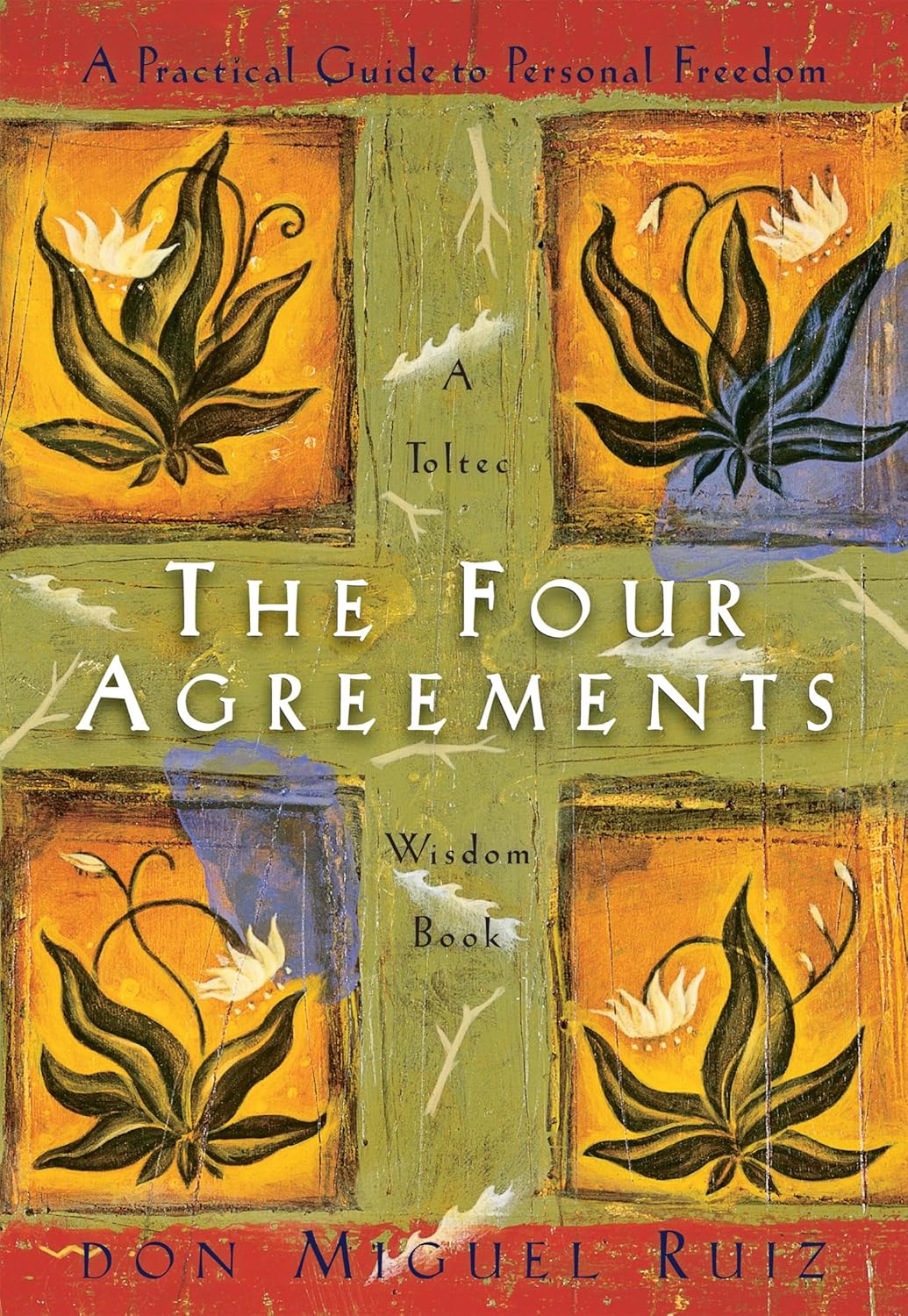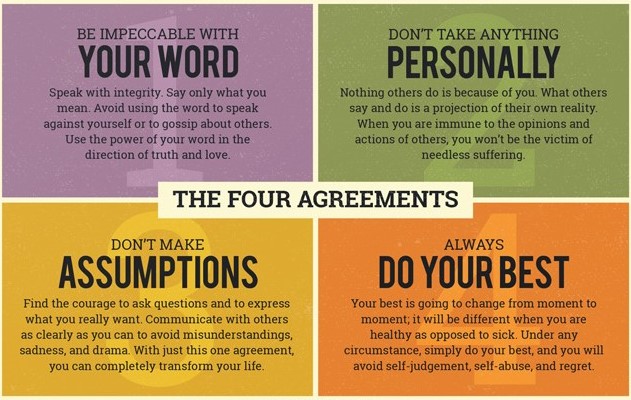
The Four Agreements: A Practical Guide to Personal Freedom by Don Miguel Ruiz
The Four Agreements by Don Miguel Ruiz: A Practical Guide to Personal Freedom is a spiritual classic rooted in the ancient wisdom of the Toltec tradition. Since its publication in 1997, the book has been celebrated for its accessible philosophy and transformative teachings. With over eight million copies sold in the U.S. alone and translations into dozens of languages, The Four Agreements continues to resonate with readers seeking personal growth, emotional healing, and spiritual clarity.
The Toltec Tradition and Ruiz’s Philosophy
Ruiz introduces the Toltec as a lineage of spiritual seekers and masters from southern Mexico who cultivated knowledge in the realms of spirit, mind, and emotion. While the historical Toltecs did exist, Ruiz uses the term more metaphorically, invoking a lineage of inner mastery rather than anchoring his teachings in strict historical reality. This foundation gives The Four Agreements by Don Miguel Ruiz a timeless quality, allowing the book to transcend cultural and temporal boundaries.
Ruiz asserts that we are all living under a collective “dream” – a construct of societal rules, familial conditioning, and limiting beliefs imposed on us from childhood. These agreements, formed unconsciously with our parents, schools, religions, and governments, shape our reality and often serve to inhibit our potential. Ruiz calls this dream the “domestication of humans.” To awaken from it, he suggests we break these old agreements and create new ones—ones based on personal freedom, self-respect, and truth.
The First Agreement: Be Impeccable with Your Word
The first and most important agreement in The Four Agreements by Don Miguel Ruiz is to be impeccable with your word. Ruiz defines “impeccability” as speaking with integrity and using one’s words in the direction of truth and love. He emphasizes the power of language: just as words can inspire and heal, they can also destroy and poison.
Ruiz draws a compelling parallel to the concept of “black magic,” arguing that gossip and careless words are forms of sorcery that can implant limiting beliefs in others. A parent telling a child they’re not good at singing, for instance, can shape that child’s self-perception for a lifetime.
To be impeccable with your word, then, means to avoid self-judgment and criticism, refrain from gossiping about others, and use language as a tool for growth and authenticity. Ruiz suggests that when we speak with clarity and purpose, we align with our highest self and become agents of change in the lives of those around us.
The Second Agreement: Don’t Take Anything Personally
The second agreement in The Four Agreements by Don Miguel Ruiz, don’t take anything personally, is a profound reminder that what others say and do is a projection of their own reality. Ruiz insists that taking things personally is the highest form of selfishness because it assumes everything is about us. In reality, people’s actions are shaped by their own agreements and internal worlds.
By internalizing this principle, one becomes impervious to insult, flattery, and judgment. This does not mean apathy or disengagement, but rather emotional detachment from the opinions of others. If someone says you are wonderful, it says more about their worldview than your intrinsic worth; the same applies when someone calls you worthless.
Ruiz encourages readers to build a strong sense of self that is not dependent on external validation. When we no longer base our self-worth on others’ opinions, we regain personal power and emotional freedom.
The Third Agreement: Don’t Make Assumptions
The third agreement in The Four Agreements by Don Miguel Ruiz, don’t make assumptions, addresses the human tendency to fill in gaps in understanding with imagined narratives. We assume we know what others think, mean, or feel, often without sufficient evidence. These assumptions can lead to misunderstandings, resentment, and conflict.
Ruiz urges readers to ask questions, seek clarity, and communicate directly. He points out that most personal drama stems from assumptions that could have been avoided through honest dialogue. In relationships, especially, assumptions can be toxic. Assuming a partner knows what we need or feel can lead to disappointment when our unspoken expectations go unmet.
By avoiding assumptions, we practice humility and respect for others’ autonomy. We acknowledge that we do not know everything and open ourselves to deeper, more authentic connections.
The Fourth Agreement: Always Do Your Best
The final agreement The Four Agreements by Don Miguel Ruiz, always do your best, is both a call to action and a safeguard against self-judgment. Ruiz recognizes that our “best” will vary depending on circumstances—how much energy we have, our mood, our health. The key is consistency, not perfection.
By doing our best, we avoid regret and guilt. We don’t overextend ourselves to meet unrealistic standards, nor do we fall into laziness or avoidance. Ruiz frames this agreement as a kind of spiritual insurance policy: if we fail to be impeccable with our word or fall into making assumptions, doing our best allows us to forgive ourselves and move forward.
This agreement ties the other three together, providing a practical foundation for their implementation. It’s about showing up fully for life, regardless of the outcome. In Ruiz’s words, “Just do your best — in any circumstance in your life. It doesn’t matter if you’re sick or tired, if you always do your best there is no way you can judge yourself.”
.

.
The Process of Breaking Old Agreements
Ruiz does not minimize the difficulty of implementing these agreements. He explains that much of our belief system has been internalized over decades and reinforced by fear, shame, and punishment. To break free, we must become “spiritual warriors,” confronting our inner Judge (the part of us that punishes) and Victim (the part that suffers).
This process requires awareness and courage. Ruiz suggests practices like meditation, mindful speech, and conscious observation to identify when we are violating the agreements. He also emphasizes forgiveness—both for ourselves and for others—as a critical component of transformation.
Psychological and Spiritual Underpinnings
While Ruiz grounds his teachings in Toltec wisdom, the ideas in The Four Agreements by Don Miguel Ruiz align closely with contemporary psychological insights. The concept of reframing thoughts, separating oneself from others’ projections, and breaking destructive cognitive patterns echoes principles from cognitive-behavioral therapy (CBT).
Spiritually, The Four Agreements by Don Miguel Ruiz integrates concepts from Buddhism (non-attachment), Stoicism (self-mastery), and New Age spirituality (the power of intention). This fusion makes Ruiz’s message accessible to a broad audience, regardless of religious background.
Cultural Impact and Reception
The Four Agreements by Don Miguel Ruiz has had a profound cultural impact. Its simple structure and universal truths have made it a staple in self-help literature and spiritual workshops. Celebrities like Oprah Winfrey and Tom Brady have praised the book, citing it as life-changing.
However, some critics argue that its simplicity can border on reductiveness. Others point out that the book’s Toltec framing may romanticize or oversimplify indigenous traditions. Nonetheless, the book’s core value lies not in scholarly precision but in its practicality. It provides a framework for self-inquiry and change that readers can adapt to their own lives.
Practical Application
The real power of The Four Agreements by Don Miguel Ruiz lies in its implementation. It is not a book meant to be read once and forgotten but lived daily. Here are a few ways readers can incorporate its teachings:
- Daily Reflection: At the end of the day, reflect on whether you upheld each agreement. Did you speak impeccably? Did you make assumptions? Did you take anything personally?
- Communication Practices: Use the second and third agreements to guide interactions. When conflict arises, ask clarifying questions and remind yourself that others’ behavior is not about you.
- Mantras or Affirmations: Create affirmations based on the agreements. For example, “I speak with integrity,” or “I release the need to take things personally.”
- Journaling: Document situations where old agreements surfaced, and reframe them using the Four Agreements.
- Accountability Partner: Share the book with a friend or partner and support each other in applying its principles.
Final Thoughts
The Four Agreements by Don Miguel Ruiz is a deceptively simple book. Its brevity and clarity conceal the depth of its implications. Ruiz offers a practical path to inner peace, rooted not in dogma but in daily practice and personal honesty. The book’s enduring popularity is a testament to its resonance in a world increasingly hungry for clarity, authenticity, and personal power.
The four agreements—be impeccable with your word, don’t take anything personally, don’t make assumptions, and always do your best—are more than guidelines. They are tools for transformation, capable of liberating individuals from the suffering caused by unconscious living. While no book can be a panacea, Ruiz’s work provides a powerful foundation for those ready to break the bonds of limitation and step into personal freedom.
Check out The Four Agreements by Don Miguel Ruiz on Amazon by clicking here.
If you found this review useful please share it with friends and family and then check out some of our other Book Reviews.
.
